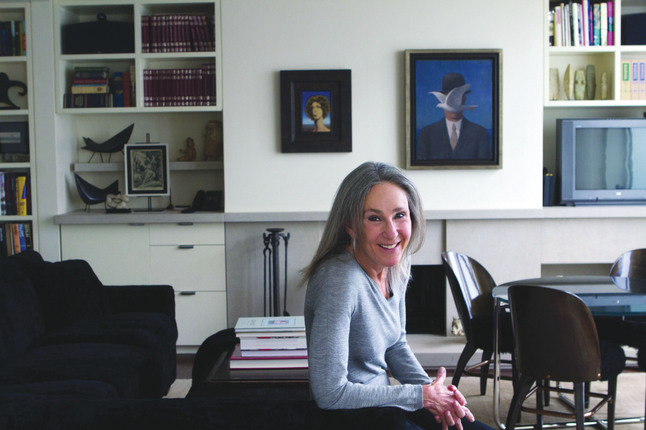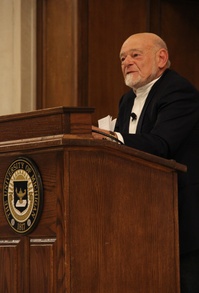
Helen Zell earned her English degree at Michigan in 1964.
Photo courtesy Zell Family Foundation
Helen Zell, who earned her English degree at Michigan in 1964, has been supporting the Michigan program with smaller gifts totaling more than $10 million over more than a decade. Five long bookshelves, nearly covering an entire wall of her Chicago apartment, are filled with books written by the graduate program's faculty and alumni, she said, and she looks forward to adding more. Graduates include writers Elizabeth Kostova, Hanna Pylvainen and Jesymn Ward.
In a telephone interview, Zell described the new donation as an investment in some of the world's promising young poets and novelists, to ensure the books they have inside them get written, shared with the world, and allowed to work the unique magic of human self-reflection that literature offers.
"What I've watched happen with the introduction of the Internet and media and blogging, I almost feel like this part of our education is under siege," Zell said. "The ability of fiction to develop creativity, to analyze the human psyche, help you understand people — its' critical. It's as important as vitamins or anything else. To me, it's the core of the intellectual health of human beings."
The gift — the third-largest ever to the university — comes from the Zell Family Foundation, where Helen Zell is executive director, and is in her name. Her husband, who endured a contentious tenure as chairman of media conglomerate Tribune Co., which he took private but then led into bankruptcy, is also a Michigan alumnus who has made substantial gifts to the university.
For aspiring writers, a spot in Michigan's graduate program is already akin to winning the lottery. Just 22 of roughly 1,000 applicants annually are accepted. Nationally, MFA students are among the most indebted, often borrowing six figures to pay for school then struggling to pay repay their loans. But Michigan covers tuition and offers a $22,000 stipend for students while they take classes their first year, then pays them for teaching during their second.
Most unusually for the field, all students receive a third, postgraduate year of support, including health insurance, to focus on their work. The bonus year, already funded by Zell, has been dubbed on campus a "Zellowship."
"Writers should be at their desk, not at Starbucks serving coffee," she said.
Kostova, whose debut novel "The Historian" rose quickly to No. 1 on The New York Times bestseller list, and Ward, whose 2011 novel "Salvage the Bones" won the National Book Award, are among the program's better-known graduates. Pylvainen, whose first novel "We Sinners" won a Whiting Writers' Award last year, said the book might never have been written without the third-year fellowship.
There are no plans to expand the program, which Zell said might dilute its quality. Rather, the gift will essentially underwrite it in perpetuity, while offering flexibility for new projects.
"What happens next is you can write it in pen, as it were, that Ann Arbor is going to be one of the places in the country where some of the most important new writing is going to be happening as far into the future as you can see," said Michael Byers, director of the program, which will be renamed for Helen Zell.
American universities raised $31 billion last year, according to the Council for Aid to Education, but most of the giant, transformative gifts in recent years have provided either general support or targeted medical and scientific research. Recent large gifts include $100 million from The Grainger Foundation to the University of Illinois engineering school in January and $100 million in December to UCLA's medical school.
New York Mayor Michael Bloomberg also recently announced a $350 million gift to Johns Hopkins University to support interdisciplinary research and student aid. Overall he has given more than $1 billion to the university, much of it focused on public health.

Sam Zell speaks at the Zell Lurie Institute’s Private Equity conference at the Michigan Union.
Ben Freed | AnnArbor.com
"The bigger donors tend to give these larger gifts to research or construction projects, more in the sciences," said Pam Russell, director of communications at CASE. But gifts to the humanities can go farther, in some ways, because the work is less expensive to support, and reflect "great confidence in these institutions" by donors.
Zell said her husband asked her over dinner more than a decade ago, when she had as yet done little philanthropy, what she might like to do for her alma mater, where she fondly recalled studying literature. That led to dinners and meetings with Michigan MFA faculty like novelist Nicholas Delbanco, where they talked — only half-jokingly — about building a program that could rival or surpass the famed one at the University of Iowa. It worked: Iowa and Michigan are ranked No. 1 and 2 in the most recent Poets & Writers magazine MFA rankings.
The latest gift reflects confidence not only in Michigan but "in the really vital and human mission of literature itself," Byers said. "More and more we are turning to art of one kind or another to make sense of what's going on around us. What's so glorious about Helen's gift is it allows for the making of art that would otherwise go unmade, we fear, and for the telling of stories that would otherwise go untold."
Certainly, Zell acknowledged, some writers are so driven they will find a way to publish no matter what.
But if given "a loamy garden," she said, many more "will also produce and will bear wonderful fruit."